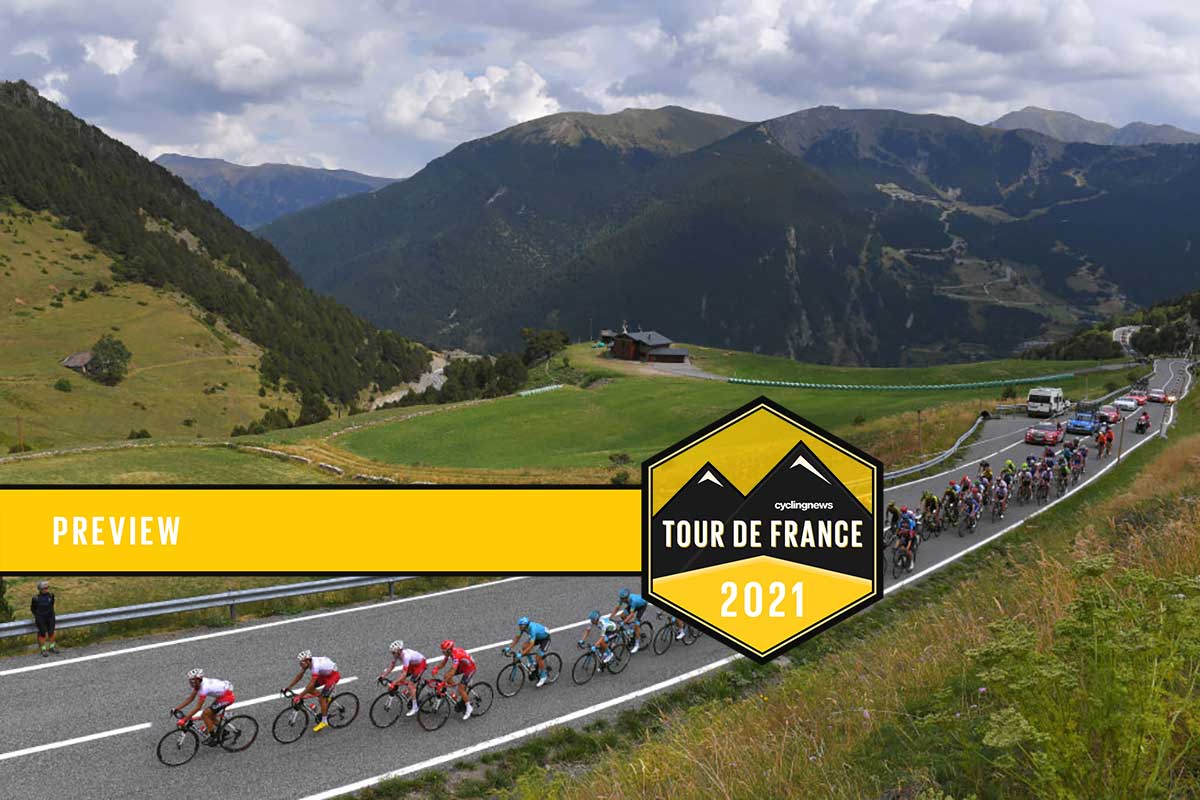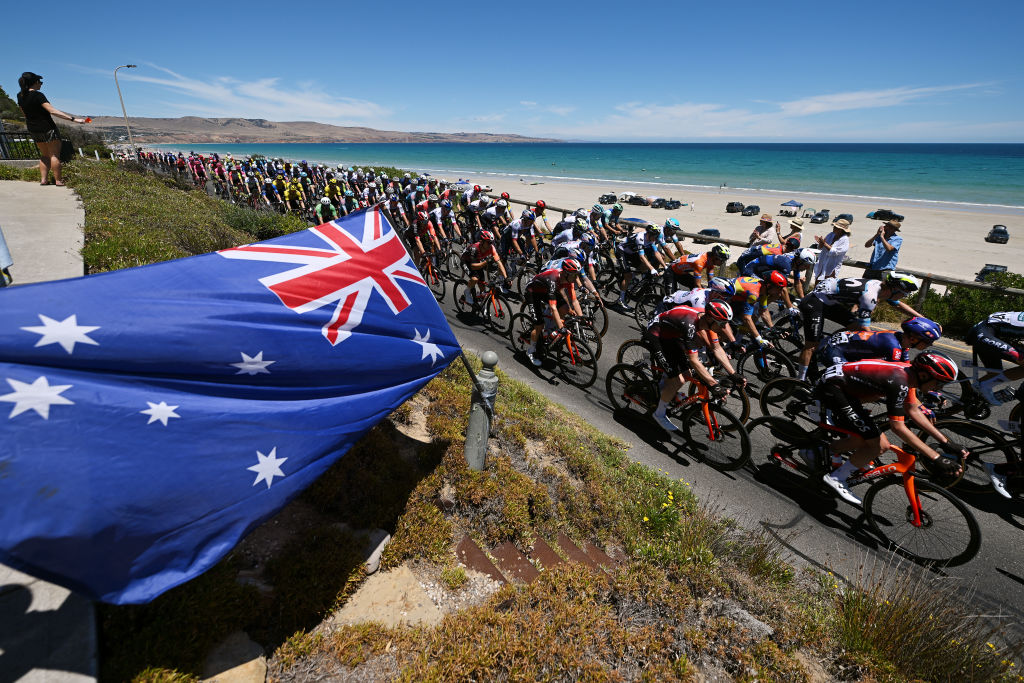Tour de France podium battle resumes in the Pyrenees - Preview
Race makes first visit to Andorra since 2016

The Tour de France heads back into the mountains with a vengeance on Saturday, for the better part of a week of climbing stages through the Pyrenees that could well prove decisive in the race's outcome.
It shouldn't be forgotten that after the Pyrenees another mid-length time trial mirroring that of the first week could theoretically play a key role in the GC battle.
Two mountain stages this weekend, followed by another three after Monday's rest-day could well prove more than sufficient to decide the 2021 Tour's GC and render that last TT slightly irrelevant.
The 2021 Tour's incursion into the Pyrenees is notably tougher than what the riders faced in the Alps, where only two stages took place compared to the Pyrenees' five. After such a ferociously difficult first half of the Tour, the Pyrenees could be where the toll among riders who are weakest is heaviest.
The weather in the Pyrenees is indeed expected to be much better than last weekend's freezing deluges and that could partly limit the damage. But given race leader Tadej Pogacčar's track record in this year's time trials, that his one moment of weakness was on the Mont Ventoux, and that his team's climbing support may be weakened if Rafal Majka finally drops out, the Pyrenees represent the best remaining opportunity for the GC contenders to strike.
Saturday's trek through the Pyrenean foothills is probably the easiest stage of the five in the mountain range. Starting in Carcassonne and with an unprecedented finish in Quillan, a town which also plays host to one of France's most famous and long-standing criteriums, two category 3 and three category 2 ascents may not prove tough enough to see an all-out battle ensue. But with 2,900 metres of climbing and the last ascent plus the category 2 Col de Saint-Louis just 17 kilometres from the finish, it would be no surprise if there were skirmishes between the GC contenders at the very least.
Sunday's ride into the principality of Andorra is much more of a classic set piece high mountain stage, comprising three first category ascents and a headlong drop into the finish town of Andorra la Vieille. What stands out, however, is the altitude gain of over 4,500 metres. The altitude hits 2,408 metres as the peloton crests the summit of the Port d'Envalira, the highest Pyrenean mountain pass, on the border between Andorra and France.
The latest race content, interviews, features, reviews and expert buying guides, direct to your inbox!
The ascent to Envalira is technically only 10.7 kilometres long. But the total climbing distance is actually more than triple that, starting at the town of La Tour en Carrol at km 114 and only ending after a second category climb, the Puymorens, a very short descent and then the Envalira immediately afterwards, which peaks at km 146.7. Add in the altitude factor and suddenly we're in 'anything could happen' territory.
Recent Tour history does not give us many reference points in that area. The previous visit to Andorra was in 2016 when the race went through Sunday's finish town of Andorra la Vieille en route to Arcalis and a fine summit finish win in a vicious hailstorm for Tom Dumoulin. The last Grand Tour finish in Andorra la Vieille itself was in the 2017 Vuelta a España, when Vincenzo Nibali claimed a solo victory after the peloton went over the first category Rabassa and then the much steeper second category Alto de la Cornella.
The profile of the finale of the 2021 Tour stage into Andorra has a certain similarity, with a long ascent over the first category Envalira and then a much shorter, punchier, Col de Beixalis that follows. But the Tour's stage, overall, is far harder.
Put it all together and assuming - and it's not a minor assumption - Pogacar remains unreachable with his five-minute advantage overall, the battle for the other placings on the podium could become ferocious. That's partly because so little has been decided in comparison to Pogačar's massive GC margin. Only 40 seconds separate Rigoberto Uran (EF Education-Nippo); Jonas Vingegaard (Jumbo-Visma), Richard Carapaz (Ineos Grenadiers), and Ben O'Connor (AG2R Citroën) in fifth. There is a lot to play for.
"Saturday's stage will probably be a breakaway but if someone's keen and wants to gain a couple of seconds then they'll have a chance, O'Connor, who lives in Andorra most of the year, told Cyclingnews on Friday. "But then Sunday is really hard."
"It's very draggy at the start, you're going to be on the pedals all day. Then there's that long descent from Envalira and Beixalis is an absolute wall compared to the others you'll have done that day as well."
As for the final climb, O'Connor says "It's not a long climb or a steady rhythm kind of climb, it's really steep in some of the sections."
"The bottom is full-on and after that, it's quite fast. It's a perfect road surface, the descent is really nice, tricky but.… fortunately personally I know it like the back of my hand so that part doesn't worry me."
"It's actually quite simple as a stage unless you've got some grand plan and want to go long, but that's not going to happen on the Andorra stage. But it's going to be one of the most decisive points of the rest of the race, I think, all the same."
O'Connor's own strategy, he says will initially consist of "playing smart and holding on as long as I can. I can be a diesel, I'm not explosive, I'm not [Julian] Alaphilippe (Deceuninck-Quick Step)." However, he doesn't rule out making his own move if he can. As he showed by winning at Tignes and in the Giro last year, " I'm not poor at launching attacks or following them, either, unless I have a bad day like I did on the Ventoux."
The last part of the Tour's '2021 Andorra experience' will be a rest day on Monday, the second of the race. O'Connor lives in the principality when in Europe, but his plans post-weekend are very straightforward: "I'll just rest as much as can," he said. "This has been intense." And this opening Pyrenean weekend certainly promises to continue in that tradition.
Alasdair Fotheringham has been reporting on cycling since 1991. He has covered every Tour de France since 1992 bar one, as well as numerous other bike races of all shapes and sizes, ranging from the Olympic Games in 2008 to the now sadly defunct Subida a Urkiola hill climb in Spain. As well as working for Cyclingnews, he has also written for The Independent, The Guardian, ProCycling, The Express and Reuters.

